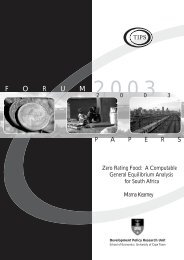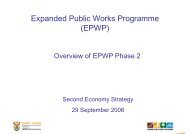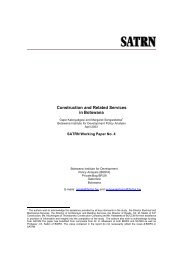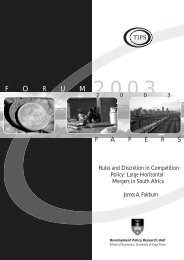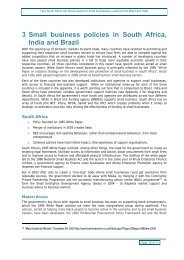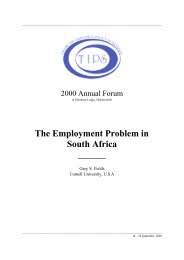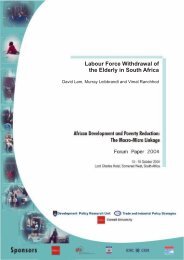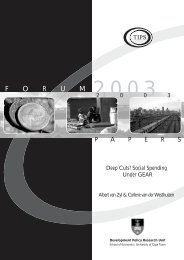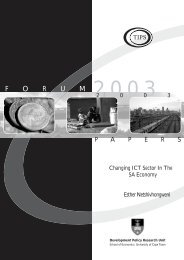Monitor Vol 39 08_Final_Nov08.pdf - tips
Monitor Vol 39 08_Final_Nov08.pdf - tips
Monitor Vol 39 08_Final_Nov08.pdf - tips
Create successful ePaper yourself
Turn your PDF publications into a flip-book with our unique Google optimized e-Paper software.
the local environment). On the positive side, the nascent biofuels industry<br />
should look at how the brewing and the sugar industry manage to do well<br />
in Africa. Inadequate maintenance and bad quality of products (lack of<br />
standardisation and quality control) is due to the fact that the technology<br />
and option are not suited to local African resources and need. Technical<br />
success of biofuel project will be a function of capacity/ manpower availability<br />
to operate and carry out maintenance operation on the plant and<br />
of course spare part availability. This is obviously lacking in most African<br />
countries. It has been discovered that the capital cost of a plant varies<br />
significantly from place to place depending on the infrastructure already<br />
in place. The surrounding infrastructure will, therefore, influence the profitability<br />
of the project.<br />
4.4. Information Hurdles<br />
Lack of awareness and limited information on the national RE resource<br />
base, their benefits both economically and environmentally is a barrier<br />
to the market penetration of RE in general and biofuels projects specifically<br />
in most African countries. The public is, therefore, not educated to<br />
influence the government to begin to take more decisive initiatives in<br />
enhancing the development, application, dissemination and diffusion of<br />
biomass energy resources and technologies in the national energy market.<br />
The fact that the stakeholders and the consumers are not sensitised to the<br />
potentials of biomass energy is another issue. This will probably affect the<br />
view of investing as risky.<br />
Poor telecommunications infrastructure (especially poor internet access,<br />
and lack of adequate telephone access—this is changing with the advent<br />
of mobile telecoms) and high cost of services is also a source of barrier to<br />
biofuel commercialisation. Among the benefits of telecommunications for<br />
improving efficiency and productivity are the following:<br />
• Reduction of travel cost: in many cases telecommunications can be<br />
substituted for travel, resulting in savings in personnel time and travel<br />
costs.<br />
• Energy savings: telecommunications can be used to increase the efficiency<br />
of shipping so that trips are not wasted and consumption of<br />
fuel is minimised.<br />
• Decentralisation: availability of telecommunications can help attract<br />
industries to rural areas, and allow decentralisation of economic activities<br />
away from major urban areas.<br />
There is often no industrial association or other co-ordinating body that<br />
can help todevelop networks of actors in the RE sector.<br />
4.5. Capacity/Manpower Hurdles<br />
The limited availability of correctly trained and skilled manpower is one<br />
of the most critical requirements to the development and market penetration<br />
of biofuels in Africa. This is largely due to the exodus of highly trained<br />
manpower from developing countries most especially Africa to industrialised<br />
nations. By a way of example, Africa as a whole counts only 20,000<br />
scientists (3.6% of the world total) and its share in the world’s scientific<br />
output has fallen from 0.5% to 0.3% as it continues to suffer the brain<br />
drain of scientists, engineers and technologists 59 .<br />
The increased number of this exodus attributed to the deteriorated political,<br />
economic, and social conditions in Africa reduces the availability of skilled<br />
manpower (human resources) which African countries need so badly for<br />
self-reliant and sustainable development. This has led to increased cost of<br />
doing business in Africa as expatriates to carry out installation, operation<br />
and maintenance of biofuel technology need to be imported.<br />
5. Conclusion<br />
Energy is a key factor in industrial development and in providing vital services<br />
that improve the quality of life. However, its production, use, and byproducts<br />
have resulted in major pressures on the environment, both from<br />
a resource use (depletion) and pollution point of view. The decoupling<br />
of inefficient, polluting fossil energy use from development represents a<br />
major challenge of sustainable development. The long-term aim is for development<br />
and prosperity to continue through gains in energy efficiency<br />
rather than increased consumption, supported by a transition towards the<br />
environmentally friendly use of renewable resources. On the other hand,<br />
limited access to energy is a serious constraint to development in the developing<br />
world, where the per capita use of energy is less than one-sixth<br />
that of the industrialised world.<br />
Renewable energy technologies (RETs) and specifically biofuels offer developing<br />
countries some prospect of self-reliant energy supplies at national<br />
and local levels, with potential economic, ecological, social, and security<br />
benefits (biofuels are a component of the diversification for future energy<br />
demand). Achieving the widespread utilisation of biofuels can be realised<br />
through proper understanding of its economics. NEPAD and the African<br />
Union (AU) both have roles to play in developing rational energy policy<br />
and encouraging biofuel investment across the continent. Information<br />
exchange and experience sharing should be encouraged amongst institutions<br />
and practitioners that are engaged in the promotion of sustainable<br />
consumption and production. In this regards, the on-going African Round-<br />
65<br />
Trade & Industry <strong>Monitor</strong><br />
Commercialisation of biofuel industry in Africa: A review



